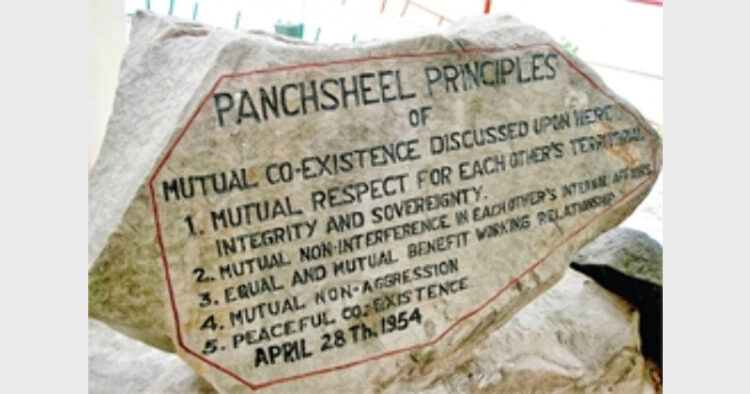Editorial:Punching ‘Bag’gage of Panchsheel
One must have heard of wrong selling of insurance policies but here is one bilateral agreement that was wrongly sold in India by none other than the first Prime Minister Jawaharlal Nehru. The Agreement between Nehru and the Chinese Premier, Zhou Enlai, is originally titled as ‘Transborder Trade and Cultural Engagement between India and the Tibet region of China’. Though the agreement lapsed in 1962, its five principles of peaceful coexistence remained hallmark of Nehruvian foreign policy gestures. The 60th anniversary of India-China treaty is being celebrated in Beijing and also attended by the Vice President of India Hamid Ansari. Fortunately, when there is a lull over this disastrous agreement on Indian side and a proactive government with alternative policy thinking is in place, here is the time to assess the impact of this agreement on Indian foreign policy imperatives.
First of all, Panchsheel erased an age-old nation of Tibet from the map of Asia. During a debate in the Parliament in 1958, the Socialist leader Acharya Kripalani stated: “This great doctrine was born in sin, because it was enunciated to put the seal of our approval upon the destruction of an ancient nation which was associated with us spiritually and culturally… It was a nation which wanted to live its own life and it sought to have been allowed to live its own life.”
The Agreement not only recognised Chinese claim over the British India controlled region of Tibet, but also made India susceptible to the continuous Chinese pressures for territorial claims. This same mindset has led to defeat of India in 1962 war.
Another important ramification of this agreement has been China’s growing presence in the South Asian region. After Tibet, strategically important Gilgit-Baltistan, visa issues in Arunachal Pradesh, overt and covert support to Pakistan, Naval base in Sri Lanka, support to Maoists in Nepal and insurgent groups in the Northeast India etc have been extension of Chinese encirclement policy. It also denied India its rightful space in immediate neighbourhood.
The only beneficiary of this so called ‘Panchsheel’ was Nehru who could project himself as a statesman on the global stage. Nehru successfully sold this blunder as five point agenda, which find mention only in the preface to the agreement. The victim was India’s sovereignty.
With the decisive change of guards at the Centre, it is expected that India will no longer carry this punching baggage of Panchsheel. A strong and decisive interaction with all neighbours and great powers on own terms need to be established. Even India should carve out its renewed role in international organisations with due power status. The obvious corollary of action is to get out of action-reaction ad-hoc policy measures and redefine India’s foreign policy principles based on identity and interest. If the Indian voice of ‘peace’ and ‘coexistence’ had to be taken seriously, India has to have powerful doctrine and actions. It is need of the hour not only for India, but also for the whole world.
-Prafulla Ketkar














Comments